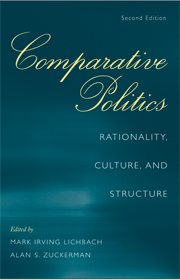Book contents
- Frontmatter
- Contents
- Contributors
- Preface and Acknowledgments
- 1 PARADIGMS AND PRAGMATISM
- 2 THINKING AND WORKING IN THE MIDST OF THINGS
- 3 ADVANCING EXPLANATION IN COMPARATIVE POLITICS
- 4 STRONG THEORY, COMPLEX HISTORY
- 5 RECONSIDERATIONS OF RATIONAL CHOICE IN COMPARATIVE AND HISTORICAL ANALYSIS
- 6 CULTURE IN COMPARATIVE POLITICAL ANALYSIS
- 7 RESEARCHING THE STATE
- 8 AN APPROACH TO COMPARATIVE ANALYSIS OR A SUBFIELD WITHIN A SUBFIELD?
- 9 THE GLOBAL CONTEXT OF COMPARATIVE POLITICS
- 10 COMPARATIVE PERSPECTIVES ON CONTENTIOUS POLITICS
- 11 CITIZENSHIP IN DEMOCRATIC POLITICS
- 12 NESTED CITIZENS
- 13 BACK TO THE FUTURE
- 14 THE COMPARATIVE POLITICAL ECONOMY OF THE WELFARE STATE
- 15 MAKING CAUSAL CLAIMS ABOUT THE EFFECT OF “ETHNICITY”
- References
- Author Index
- Subject Index
- Titles in the series
14 - THE COMPARATIVE POLITICAL ECONOMY OF THE WELFARE STATE
Published online by Cambridge University Press: 05 June 2012
- Frontmatter
- Contents
- Contributors
- Preface and Acknowledgments
- 1 PARADIGMS AND PRAGMATISM
- 2 THINKING AND WORKING IN THE MIDST OF THINGS
- 3 ADVANCING EXPLANATION IN COMPARATIVE POLITICS
- 4 STRONG THEORY, COMPLEX HISTORY
- 5 RECONSIDERATIONS OF RATIONAL CHOICE IN COMPARATIVE AND HISTORICAL ANALYSIS
- 6 CULTURE IN COMPARATIVE POLITICAL ANALYSIS
- 7 RESEARCHING THE STATE
- 8 AN APPROACH TO COMPARATIVE ANALYSIS OR A SUBFIELD WITHIN A SUBFIELD?
- 9 THE GLOBAL CONTEXT OF COMPARATIVE POLITICS
- 10 COMPARATIVE PERSPECTIVES ON CONTENTIOUS POLITICS
- 11 CITIZENSHIP IN DEMOCRATIC POLITICS
- 12 NESTED CITIZENS
- 13 BACK TO THE FUTURE
- 14 THE COMPARATIVE POLITICAL ECONOMY OF THE WELFARE STATE
- 15 MAKING CAUSAL CLAIMS ABOUT THE EFFECT OF “ETHNICITY”
- References
- Author Index
- Subject Index
- Titles in the series
Summary
Comparative research on the welfare state goes back to the mid-nineteenth century. As such, it is as old as the welfare state itself. Fabians looked for arguments on how to help the poor and also minimize distortions from state interventions. In Germany, Kathedersozialisten such as Gustav Schmoller and Adolph Wagner searched for policy instruments that could lift citizens out of poverty while cementing their allegiance to the prevailing political order (Schmoller 1900; Wagner 1892; cf. Backhaus 1997).
Over the past three decades, the literature exploring the causes and distributive implications of various social programs has grown at a dramatic pace. Methodologically, the study of social policy has provided fertile ground for the interplay of structuralist, rationalist, and culturalist perspectives. Structuralist scholars have explored how processes such as state-building (Rokkan 1974) or industrialization (Rimlinger 1971; Wilensky 1975) impacted differences in spending. Culturalist explanations have drawn attention to cognitive biases of policymakers in accounting for changes in policy (Weyland 2004, 2007) or stressed the importance of societal norms and values, such as altruism, in conditioning public support for redistribution. Rationalist scholars have contributed to our understanding of the social policy preferences of societal actors – such as unions or employers – and of politicians who balance office-seeking and ideological commitments. They have also drawn attention to the strategic component of the process of bargaining over various social policies and shown how differences in institutional and political rules constrain this strategic interaction (Kitschelt 2001; Mares 2000, 2001b; Iversen and Soskice 2006).
- Type
- Chapter
- Information
- Comparative PoliticsRationality, Culture, and Structure, pp. 358 - 375Publisher: Cambridge University PressPrint publication year: 2009
- 4
- Cited by

